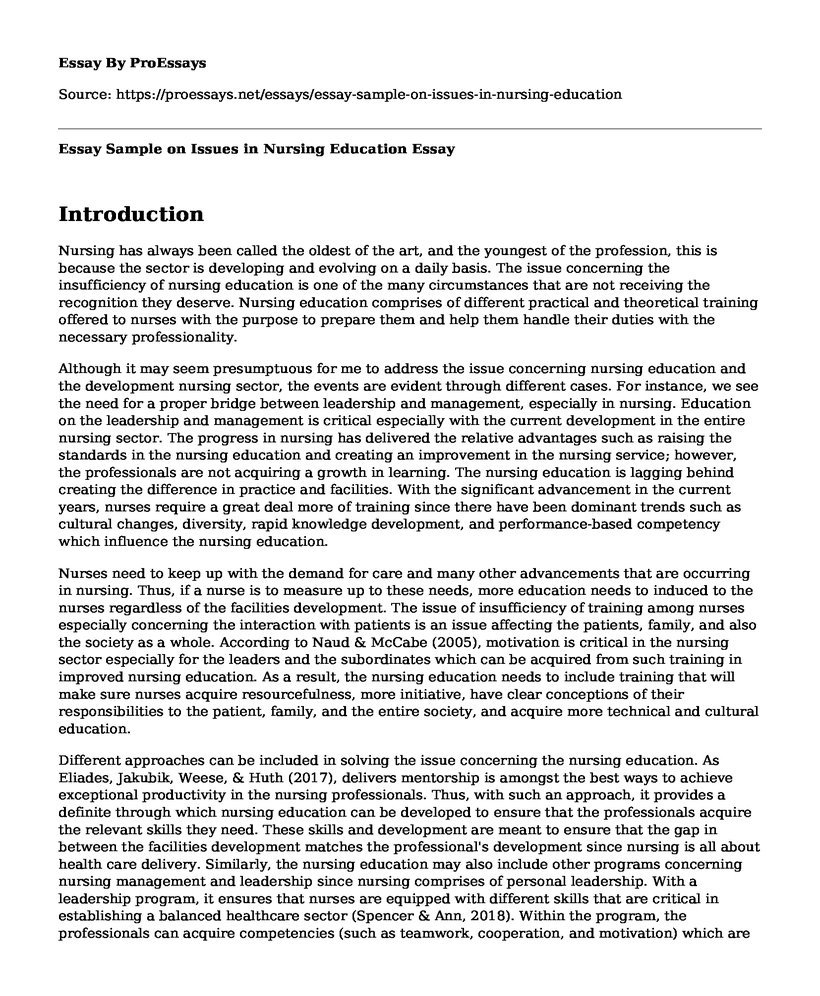Introduction
Nursing has always been called the oldest of the art, and the youngest of the profession, this is because the sector is developing and evolving on a daily basis. The issue concerning the insufficiency of nursing education is one of the many circumstances that are not receiving the recognition they deserve. Nursing education comprises of different practical and theoretical training offered to nurses with the purpose to prepare them and help them handle their duties with the necessary professionality.
Although it may seem presumptuous for me to address the issue concerning nursing education and the development nursing sector, the events are evident through different cases. For instance, we see the need for a proper bridge between leadership and management, especially in nursing. Education on the leadership and management is critical especially with the current development in the entire nursing sector. The progress in nursing has delivered the relative advantages such as raising the standards in the nursing education and creating an improvement in the nursing service; however, the professionals are not acquiring a growth in learning. The nursing education is lagging behind creating the difference in practice and facilities. With the significant advancement in the current years, nurses require a great deal more of training since there have been dominant trends such as cultural changes, diversity, rapid knowledge development, and performance-based competency which influence the nursing education.
Nurses need to keep up with the demand for care and many other advancements that are occurring in nursing. Thus, if a nurse is to measure up to these needs, more education needs to induced to the nurses regardless of the facilities development. The issue of insufficiency of training among nurses especially concerning the interaction with patients is an issue affecting the patients, family, and also the society as a whole. According to Naud & McCabe (2005), motivation is critical in the nursing sector especially for the leaders and the subordinates which can be acquired from such training in improved nursing education. As a result, the nursing education needs to include training that will make sure nurses acquire resourcefulness, more initiative, have clear conceptions of their responsibilities to the patient, family, and the entire society, and acquire more technical and cultural education.
Different approaches can be included in solving the issue concerning the nursing education. As Eliades, Jakubik, Weese, & Huth (2017), delivers mentorship is amongst the best ways to achieve exceptional productivity in the nursing professionals. Thus, with such an approach, it provides a definite through which nursing education can be developed to ensure that the professionals acquire the relevant skills they need. These skills and development are meant to ensure that the gap in between the facilities development matches the professional's development since nursing is all about health care delivery. Similarly, the nursing education may also include other programs concerning nursing management and leadership since nursing comprises of personal leadership. With a leadership program, it ensures that nurses are equipped with different skills that are critical in establishing a balanced healthcare sector (Spencer & Ann, 2018). Within the program, the professionals can acquire competencies (such as teamwork, cooperation, and motivation) which are also significant in creating a solution to the issue of nursing education.
Conclusion
Nursing education is essential in nursing, especially in both leadership and management. It is one of the developments of the nursing profession since the education of nurses also includes the clinical simulations and rotations through the training with the aim to develop clinical reasoning along with care planning. Since the nursing activities affect the level and type of care delivered by the nursing professionals, the issue carries a direct impact on the patient, family and also the society. Thus, with such recommendation such as the creation of leadership programs and mentorship, they create a significant development in solving the issue of nursing education.
References
Eliades, A. B., Jakubik, L. D., Weese, M. M., & Huth, J. J. (2017). Mentoring Practice and Mentoring Benefit 6: Equipping for Leadership and Leadership Readiness-An Overview and Application To Practice Using Mentoring Activities. Pediatric Nursing, 43(1), 40.
Naud, M., & McCabe, R. (2005). Increasing retention of nursing staff at hospitals: Aspects of management and leadership. Australian Bulletin of Labour, 31(4), 426.
Spencer H., Ashley H., & Ann G., (2018). Essential Components of Leadership Development Programs. Journal Of Managerial Issues. Vol. XXX.
Cite this page
Essay Sample on Issues in Nursing Education. (2022, Aug 10). Retrieved from https://proessays.net/essays/essay-sample-on-issues-in-nursing-education
If you are the original author of this essay and no longer wish to have it published on the ProEssays website, please click below to request its removal:
- Informative Speech and Presentation: Effects of Smoking Cigarette
- Theory-Guided Practice: Application of the Goal Attainment Theory in the Infection Prevention and Control
- Essay Sample on Nursing and Social Media Use at Work
- Educating Medical MD Employer Group on Diabetic Management - Essay Sample
- Connor's Parents Dismissed for Failing to Exhaust Claims Under IDEA - Essay Sample
- New Moms: Dealing With Postpartum Depression & Prenatal Mood Disorders - Essay Sample
- Nurse's Failure to Report Patient Triage Led to Fatal Outcome - Essay Sample







